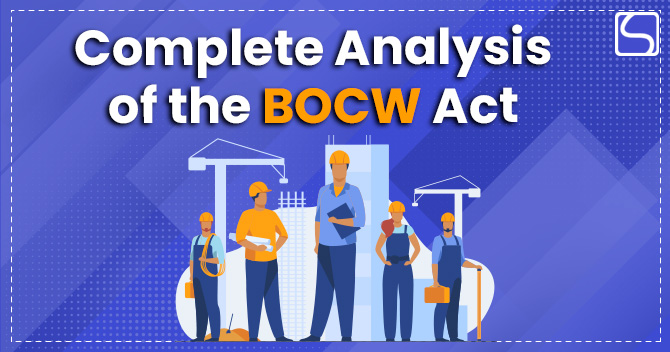Complete Analysis of the BOCW Act

krishna kumar | Updated: Jun 29, 2022 | Category: BOCW
There are more than 28 million skilled workers in the construction sector in India. The industry is labour-intensive, and most labourers are unskilled, unorganised and tend to work under inhuman and pitiful conditions. To address such brutal working conditions and poor health & safety standards in the real estate industry, the government of India introduced the Building and other constructions workers (Regulation of Employment and Conditions of Service) Act, 1996. The BOCW Act is social welfare legislation to benefit workers involved in building and construction activities whole the country. The preamble of the BOCW Act clarifies the said objective: “an Act to control the employment & conditions of favour of building and other construction workers and to deliver for their safety, health, welfare measures and for other affair connected in addition to that or subsidiary to it”.
The ambit of the BOCW Act is broad, particularly in a country where the infrastructure and construction sectors have seen significant growth. The BOCW Act’s object and framework are analogous to other labour law legislation, but specifically, the BOCW Act is related to the Factories Act 1948.
Table of Contents
A Brief Overview of the BOCW Act
- The Building and Other Construction Workers (Regulation & Conditions of Service) Act, 1996 (BOCW Act) objective to provide for the regulation of employment and conditions of service of the Building and other construction workers as also their safety, health, welfare measures in all establishment which employs ort employed ten or more workers.
- The BOCW Act exempts the constriction of residential houses for its aim constructed with a cost not more than Rs. 10 Lakh. The provision in the Act for health and safety measures for the construction workers conforms with International Labour Organisation convention No. 167 regarding safety and health in the construction sector, amending the Safety Provisions (Building) Convention, 1937.
- There is a provision in the BOCW Act for the constitution of safety committees in all establishments employing 500 or more workers with equal representation from workers and employers, in addition to the appointment of safety officers certified in the field. It also describes the Penalties of fine and imprisonment for violation and infringement of the BOCW Act.
- The Workmen’s Compensation Act 1923 shall, until now may be, apply to building workers as if they had included the employment to which this Act applies in the Second Schedule to the BOCW Act.
- Because the Building and Other Construction Workers Welfare Cess Act, 1996 is to issue for the levy & collection of a cess on the cost of construction incurred by employers to boost the asset of the Building and Other Construction Workers Welfare Boards established UNDER the BOCW Act,1996[1].
- According to the Act, 1% cess shall be collected from all employers where the construction cost is more than Rs. 10 Lakhs. The local offices or the State Government collecting the cess to the Board after withdrawing the cost of collection of cess not exceeding 1% 0f the amount collected shall pay the proceeds of the collected cess. Further, by notification in the Official Gazette, the Central Government may exempt any employer or group of employers in a State from the deposit of cess unpaid by this Act where cess is already levied & payable under any interconnected law in force in that State.
- The collection of cess and management of the Welfare Boards would be the responsibility of the concerned State Governments. The local offices or the State Government collecting the cess to the Welfare Board after withdrawing the cost of collection of cess not exceeding 1% of the amount collected shall pay the proceeds of the cess per cent under this Act.
BOCW Act Welfare Boards
All-State Government shall constitute a Board known as the Building and Other Construction Workers Welfare Board to exercise the authority conferred on and perform the functions assigned to it under the BOCW Act.
Functions of the BOCW Welfare Boards
Following are the functions of the BOCW Welfare Boards:
- to give immediate assistance to a beneficiary in case of an accident;
- To provide payment of pension to the beneficiaries who have achieved the age of sixty years;
- To sanction loans & advances to a beneficiary for construction of a house not exceeding such amount and on such terms & conditions as may be prescribed;
- To pay such amount in connection with a premium for the Group Insurance Scheme of the beneficiaries as it may be deemed fit;
- To provide such financial assistance for the education of children of the beneficiaries as may be prescribed;
- To meet medical expenses for treatment of significant ailments of a beneficiary or, such dependent, as may be prescribed;
- To provide payment of maternity benefits to the female beneficiaries; and
- To make provisions and improvement of other welfare measures and facilities as prescribed.
Penalties under BOCW Act
Whoever breaches the provisions of any rules under the BOCW Act shall be punishable with imprisonment for a term which may increase to 3 months, or with a fine which may extend to 2000 rupees, or with both, and in the case of a continuing violation, with an additional fine which may extend to 1000 rupees for every day during which such violation continues after conviction for the first such violation.
If any person who has been liable for an offence punishable under the Act is repeatedly guilty of a crime involving a violation or failure to comply with the same provision. In that case, he shall be punishable on a subsequent conviction with imprisonment for a period which may increase to 6 months or with a fine which shall not be less than 5000 rupees but which may extend to 2000 rupees or with both.
Conclusion
It is creditable that the Indian government has made welfare provisions for long-neglected construction workers. However, there have been gaps in clarity & enforcement until the courts have stepped in. The Supreme Court has simplified that building and construction workers involved in factory premises are authorised to welfare measures under the BOCW Act. Although, now the question arises as to who is accountable for obligations by the BOCW Act. The word “employer” in the BOCW Act is explained to include both contractors & owners. Hence, the owners & contractors pass the accountability to one another.
It is recognised that the Central Government is also planning to make amendments to the BOCW Act to spread the scope of applicability of the BOCW Act to enable the individual state governments to execute the Acts, and it is hoped that the amendments will correctly benefit the construction workers by providing better & safer work conditions.














